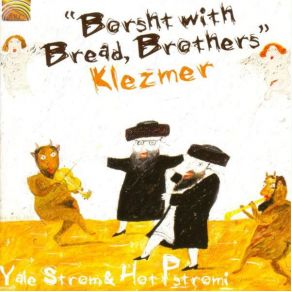Borsht with Bread, Brothers - Klezmer
Download links and information about Borsht with Bread, Brothers - Klezmer by Yale Strom, Hot Pstromi. This album was released in 2007 and it belongs to World Music genres. It contains 12 tracks with total duration of 01:16:03 minutes.

|
|
|---|---|
| Artist: | Yale Strom, Hot Pstromi |
| Release date: | 2007 |
| Genre: | World Music |
| Tracks: | 12 |
| Duration: | 01:16:03 |
| Buy it NOW at: | |
| Buy on iTunes $9.99 | |
Tracks
[Edit]| No. | Title | Length |
|---|---|---|
| 1. | Svalava Kozatshok | 4:34 |
| 2. | Mermelshteyn's Nign | 6:54 |
| 3. | Szol A Kakos Mar | 6:29 |
| 4. | Stoliner Shers, Pts. I & 2 | 4:05 |
| 5. | Meyen Nign | 2:12 |
| 6. | Vemen Veln Mir Dinen Brider | 10:27 |
| 7. | Oberek Palota | 3:36 |
| 8. | Ki Onu Amekho | 5:39 |
| 9. | Bughici's Khosedl | 7:00 |
| 10. | Kalarasher Bulgar | 8:06 |
| 11. | Ver Es Ken Keseyder Tseyln | 7:24 |
| 12. | Ben Avrameni | 9:37 |
Details
[Edit]Yale Strom is a mainstay in the circuits of klezmer music, but perhaps not as well known as the "new school" as it were (the Klezmatics, Hasidic New Wave, etc). While he's been around for a while and has a musical history of note, his release on Naxos a few years prior (Café Jew Zoo) is probably his best-known album. Here, there's a collection of music collected largely from non-Jews. Traveling through the Eastern bloc in the 1980s and '90s, Strom spent a good deal of time collecting songs from the Rom musicians who once played alongside Jewish klezmer musicians: musical co-workers largely separated by the Holocaust (on a related note there are at least a few Rom songs kept alive by Jewish musicians under the same circumstances — Strom collects both, but this album focuses on the former). On top of the almost-lost numbers, Strom composes new music, new ideas: he keeps the music alive rather than archival. The album opens with a jumping (no pun intended) kozatshka from the Ukraine, followed by a Slovakian wedding song and a piece of Hungarian Hasidic music that uses both Hebrew and Hungarian. Belorussian, Russian, Polish, and Romanian entities take a run through, but the highlight may be the rarer German piece — a little less standard in the klezmer repertoire, but probably older and more historically sound, prior to the intermixing with the Eastern European sounds. A fine outing — possibly less exciting than much of the new klezmer available, but also more exciting than most of the more archival, scratchy recordings that are out there. A nice, middle-of-the-road album for all.